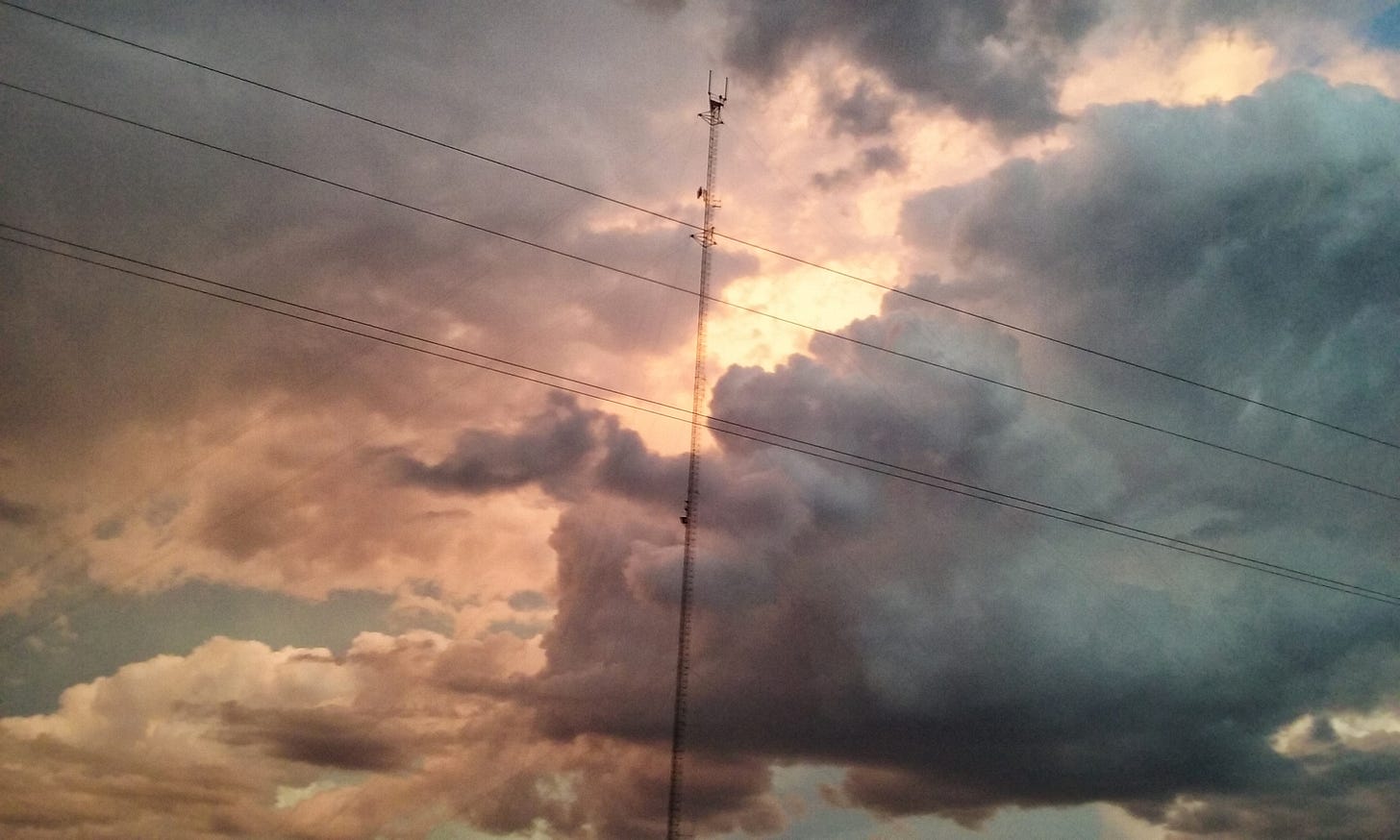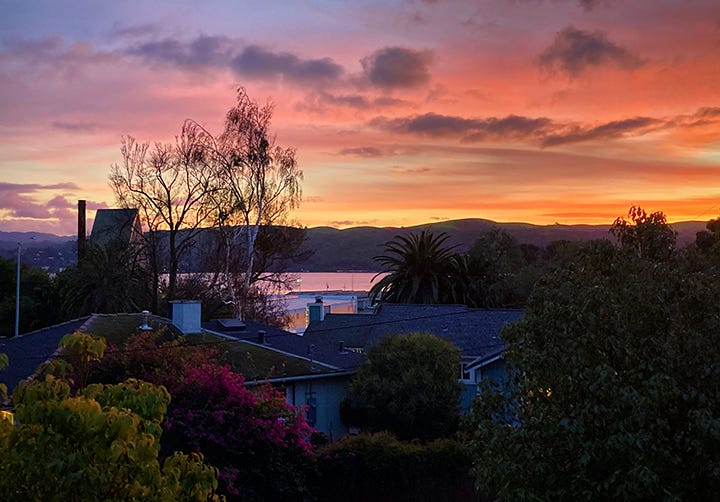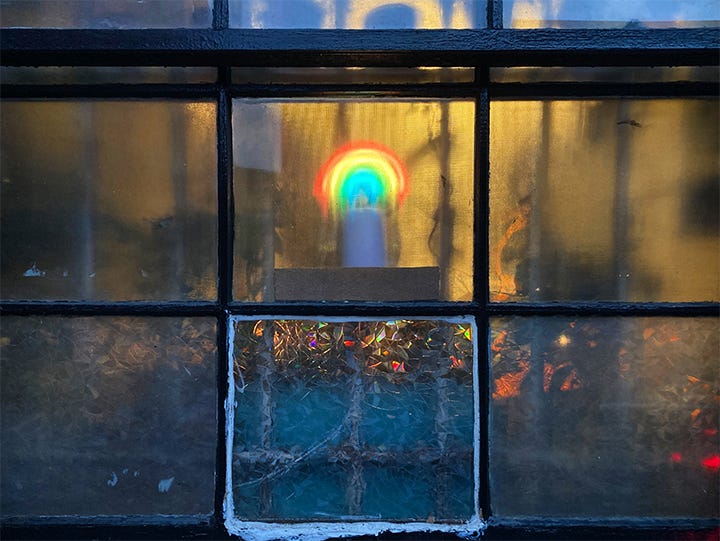The End of Everything: Part Two
After the darkness, the fogged-over quality of where I had been, I just wanted light. I wanted simplicity.
As I waited for my flight in Wichita, I realized I was living inside one of my greatest fears. Here I was, failing. I was failing spectacularly. Failing publicly. For a while, I paced up and down the glossy floor of the terminal, past the newsstand and the empty sports bar area. I bought a Dunkin’ Donuts glazed donut, ate half, and threw the other half away. Then I sat at the gate, waiting for the airplane to arrive, and I fidgeted with the luggage tag on my bag. I had bought us matching leather luggage tags before our honeymoon, a decade earlier—one with a big T and one with a big J. He didn’t like the color of the J, so we switched. It turned out, I also hated the garish orange of it. Now I flopped it over to hide the letter, then realized all the details written on the inside were about to be incorrect. I flopped it over again, feeling annoyed. Finally, I realized I could just take it off, so I did.
When I got on the airplane, I would be renouncing everything I had thought my life was about. My home and my marriage and a decade of work. This meant cutting loose an entire future that I had expected to live. It was so strange. Now that I was here, inside this thing I’d been terrified of for years, this walloping failure, it felt entirely different than I’d expected. I wished I had known it before.
I sat alone in the sunny midday airport, stunned by a feeling of gratitude. How had I not realized the whole time that I had this precious thing in my back pocket? I had a place to go. It’s like I’d had a secret superpower I hadn’t known about. Not everyone has a place to run to when they finally run away. People stay stuck in place their whole lives for lack of a place to go. For lack of a net to catch their fall. I wasn’t even the one who suggested I go to California. That’s how obvious it was that I should go to my mom’s.
“Maybe you should go stay with your mother for a while,” he had said. Granted, he said it sarcastically. But he said it at the right time. Only a few moments earlier, he had said, “I think we should get a divorce.” Another statement I wasn’t meant to take seriously.
He was throwing a tantrum. That’s the easiest reference for this scene. I knew all the stage directions from the last tantrum, and the time before. He had threatened divorce again. He had told me to leave and stay with my mother. None of this was new. The new thing was me. I wasn’t playing my part. He continued to rip apart our life in front of me, believing that I would respond the same way I always had for the past decade—that I would cry. Stammer. Apologize. Beg him to stay.
This time, I didn’t.
I suggested quietly that he come to therapy with me. He refused. Therapists were worthless. They would all side with me.
He said that I should just go stay with my mother for a while.
I said, “Okay.” And I noted the look of surprise—was it fear? —on his face.
He picked up his overnight bag and walked out the door. And, instead of following him to the front porch, or to the car, I picked up my phone and called my mom. I booked a flight.
To know that each of these acts was extraordinary, you would have needed to witness all the times before.
The next morning, he would return, and his overnight bag would take on a new dramatic dimension—didn’t I know what was in that bag? Yes, I knew. He’d kept a gun in there for years.
“I’m going to drive away,” he said. “And when they find my body, you’ll know. You’ll know what you did to me.”
It was amazing to hear him say it out loud. This had been the recurring theme of our marriage since the very beginning, but until now, he had never actually said it explicitly.
If I didn’t do what he wanted, he would kill himself.
If he killed himself, it was because I had failed him.
When you hear it out loud, you realize, Jesus Christ.
It only got worse over the next few days. He left and returned, in varying states of intoxication and frightening temper. At one point, well after I should have called the police, but before I actually did, he paused in a rare lucid moment and said:
“I’m making this easy for you.”
He was. He made it easy. He couldn’t seem to stop himself from spiraling into chaos. By that night, after he’d returned again and torn apart the house, I was hiding in my neighbors’ home across the street. By then, it felt less like I was choosing to leave him, and more like I was running for my life.
On the airplane, taxiing toward the edge of Wichita, I brought out a notebook and I wrote down everything that had happened in between calling my mom on Saturday and getting on the airplane on Tuesday. From Saturday, the last feelings of normalcy as I finished tasks and began packing. From Sunday, his ever-increasing dosage of pills. The mania. The gun. The police. From Monday, another brutal scene. He was screaming on the front lawn. More police. The two-hour drive to Wichita in the backseat of my neighbors’ car. A night at an airport motel.
Finally Tuesday: Taking flight.
I took note of the date. “12/21/21.” Then I wrote, “I’m beginning the rest of my life.”
In California, even in winter, flowers were blooming. There were trees full of leaves. In some divine felicity, my mom had recently moved into a home with a separate apartment in the basement. She was planning to rent it out, but I had managed to blow up my life with perfect timing. I arrived in the sweet spot after it was ready but before it was rented. So I had a place. A bedroom, a bathroom, a little kitchenette area where I could make coffee and tea, a little fridge for keeping cheese and some berries around. Mostly, I ate meals upstairs with my mom and her boyfriend Chris, but I started walking to the grocery store on my own and buying things to keep around for myself. I hadn’t grocery shopped just for myself in so many years, it was a strangely pleasurable experience to walk the aisles of Safeway and decide which butter I wanted. Which bread.
It’s rare to know you’re going through something enormous as it’s happening. That this will be a period of time you’ll remember forever, and that the decisions you make now will set the course for the rest of your life.
What kind of decisions did I want to make? After the muck of everything, the darkness, the fogged-over quality of where I had been, I just wanted light. I wanted health. Blueberries and long walks. I wanted simplicity.
I began by telling the truth. Stories poured out of me at odd moments, memories triggered by a passing face or the smell of something. Anything I’d kept silent for the previous decade. I learned how it felt to say the truth out loud. He watched everything I ate. He told me he would leave me if I drove to South Dakota to visit my sister. I sat on the floor of my mom’s bedroom and told her stories. I called my sister and my friend Sara. I learned how it felt to type the stories onto a page and see them in black and white.
Everyone who listened to me asked the same thing. Why couldn’t you have told me earlier? I would have helped you.
They all would have. They would have helped me to get out of that life, out of that marriage, if I’d been willing to admit that I needed out. No one could understand why I’d kept it quiet for so long.
Why had I lied? Hope. Hope was my problem. Believing I could make it work, somehow, if I just kept holding all the pieces together.
I almost broke that silence once, in 2016. I had called the office of the nearest therapy practice. I was crying and whispering, sitting with my phone on the kitchen floor. My husband was passed out upstairs, so I didn’t think he could hear me, but I wasn’t certain how long he’d be asleep. I told the receptionist I would drive anywhere, I would see anyone, if she could just get me someone to talk to that day. She told me to drive to Anthony, Kansas, 80 miles away. I left a note for my husband, in case he woke up. Then I ran out to the car and drove.
But, in the office in Anthony, I lost my nerve. Something changed as soon as I walked into the building. I had imagined lamps and soft chairs, something more like a home. Instead, there were harsh overhead lights everywhere. It seemed more like an urgent care facility, or some kind of social services. Glum, official-looking faces at the receptionist counter. Pamphlets and old magazines in the waiting room.
If I told the truth in this place, what would happen? I knew about the reporting laws. Would he get in trouble for his drugs? He would be so angry if I told anyone about his stockpiles of pills. What would they do to him, what might I accidentally set into motion, if I told them what was happening?
Finally, I heard my name and I followed a young therapist into one of the rooms. She closed the blinds over the window to cut the harsh sunlight from outside.
“You said on the phone that your husband was asleep?” She asked me.
“Yes. He took a pill.”
A pause. She wrote something down.
“He has trouble sleeping sometimes,” I quickly offered. “He has a prescription.”
She looked at me. “Does he usually go to sleep in the middle of the day?”
I could hear my heart beating. “No. No, he doesn’t.”
She was so young, the therapist. Even younger than I was. I was looking at her and thinking about her makeup, the chunky highlighting in her hair, her polyester slacks. I realized, looking around, I was probably the first person in her office who hadn’t been court-mandated to be there.
“You said you’d been fighting?” She asked.
She seemed both kind and sympathetic, which was unfortunate. I was suspicious of sympathy. If I painted her a picture of what my morning had been like, then I knew she would end up on my side, and I didn’t want her on my side. It would just confirm everything my husband believed about therapists—they all agree with the woman automatically.
And I also knew, if I told her what “fighting” meant, then she would ask me why I stayed in that marriage. She would want me to do something, to change something. To change everything. I would have to call everyone. I would have to tell everyone I had failed. I sat in the worn office chair across from her, silently panicking. If I left my marriage, then I would have to start over, find somewhere new to live, a job. How? I had no real money of my own. Everything was in his name.
Worst, I knew he would die. He always said I was the only thing keeping him alive. If I left him, then he would kill himself.
I had to get out of this conversation.
“It was my fault,” I said finally. “My anxiety has gotten so out of control lately. I get so nervous over nothing, and then I just make mistakes all the time, and when I make mistakes, I get more nervous and I can’t seem to say the words to apologize, and then he’s upset…”
She looked at me for a few seconds, then she nodded and made another note.
It’s so frustrating for me. Each time I try to write about California, I end up back in Kansas. Is it just the strange gravity of those years? Or is it the freshness of his death? Six months later, I’m still living in the fallout of my ex-husband’s suicide. I lose time, standing in the shower, or washing a dish in the sink, trying to understand what he did. Trying to work out the puzzles of our marriage. I keep running into him in my dreams.
I’ve been trying to write a piece about losing everything and starting over in California, but I have two obvious problems. First, I didn’t lose everything—only the house, the job, the marriage. If anything, I came out ahead.
And second, I no longer believe in the idea of “starting over.”
Each moment of my new life has its seeds in what came before. Each breath I took in those first days, as I walked up and down the hills of Benicia, each meal I ate, every decision, was in response to what had happened in Kansas. Not in spite of the past, but because of the past.
I had given myself permission to collapse as soon as I reached California, but when I arrived, I discovered that I was too alive to collapse. I was too healthy. I couldn’t sleep at night, but when I saw the sun in the morning, all I wanted was to run outside and feel it. I wanted more oxygen, more green leaves and beginnings. I walked for miles each day up and down the hilly streets, to the cemetery at the top of town, down to the marina, and then back again.
In the afternoons, as my energy flagged, I would begin to panic. Around 1pm each day, it would suddenly feel like too much, hiring a lawyer and figuring out how I would do our taxes from a thousand miles away, watching as my husband’s paranoia moved the pieces around the chess board. He canceled my credit card a few days after I left. He moved almost all of the money out of our bank accounts. By early afternoon, I was collapsing under the weight of it all—all his anger, all the emails and messages he was sending to me, everything he was writing online, and I would start to suffocate. That’s when I learned to close my eyes. To lie down, even for a few minutes. When I woke up, I could breathe and start the day again.
My mom and I picked out recipes from her Eating Well magazine—anything with fish and fruits and plants—and then we went to the grocery store, and we cooked and ate together. I went along with her to the gym and lifted weights. Because there was a pool nearby, I took up swimming. Each day I was with her, I imagined myself getting stronger.
I dreaded going to bed each night, so I stayed up late reading self-help books from the library. Five years after I left that therapist’s office in Kansas, I found the literature I had been avoiding, and I taught myself the therapeutic language—co-dependency, trauma bonding, grey rock, enabling... These were words I had never used before, and they’re words I have tried never to use in my writing. But, at that moment, they were useful. They gave me a connection to an invisible congregation of others who had been where I was. So, I read the books and I learned the language. Any tool at hand, as long as it would bring me health.
Each morning, as my mom and I walked her dog Moseley into town, we passed an apartment building with a strange series of large wooden stumps in the yard. They were rough wood, arranged a few feet from each other along the fenceline.
“You’ll see her one of these days,” my mom said when I asked about them. “She comes out from the building and lights incense in each of the stumps and prays.”
As I looked more closely, I could see charred spots on the wood.
“I always want to talk to her,” my mom said, “but I don’t want to interrupt, so I never have.”
Each day, as I passed by, I watched the curtained windows of the apartment building. Then finally, one afternoon, on my way back from the Safeway, I saw her out in the yard. She looked like anyone, a middle-aged woman with long dark hair and a long skirt. She was bent over one of the stumps, lighting her incense.
I watched her from across the street. What would I have said to her, if I could?
“I don’t have any rituals,” I wanted to tell her. “I used to, but now I don’t.” I had left all of that behind in Kansas, all the practices that had put order to days and years. The anniversaries and inside jokes and shared superstitions. I hadn’t developed any of those myself. They were mostly dictated to me, and I didn’t want them now. They felt tainted, even repulsive. They all felt like him.
But now I was unmoored in this between-life, and I wished for what she had. How could I build a new life without any rituals? Surely, there was something I held sacred. Some foundation to build on. I didn’t know what to do—should I pray? meditate? light candles? —in order to shape this formless mass of time and activity into meaning.
The incense lit, and the woman studied it carefully as the flame died down to an ember. She tucked her matches into a pocket of her skirt, and I caught the scent of the smoke from the sidewalk.
I imagined what she might say to me, if I asked her how I could have what she had.
“What do you think I can do for you?” I imagined her saying. “I’m not a witch. Go figure it out yourself.”
I shifted my bag of groceries from one tired hand to the other, and I left the woman to her incense and prayers.
I did have one new ritual of my own. One flickering start at a system of meaning to guide my new life. As I walked along the road to my mom’s house, I listed my gratitude.
I am grateful to have a place to go.
I am grateful for people who love me.
I am grateful for walks and healthy legs.
I am grateful for all the talking. The phone calls. For pen and paper, all the scrawled pages of journal entries, and for the help inside the self-help books.
I am grateful for sunlight.
And what about the empty calendar? The months and years and the whole remaining life that’s yet to be revealed?
Yes. Even for the wild, uncut field of the future. And for the days, all of them. However many days I have.
Tonya Morton is, among other things, the publisher of Juke.
If you enjoyed this post, hit the ♡ to let us know.
If you have any thoughts about it, please leave a comment.
If you think others would like it, hit re-stack or share:
If you’d like to read more:
To help create more Juke, upgrade to a paid subscription (same button above). Otherwise, you can always contribute a one-time donation via Paypal/Venmo @Jukepress






Please pardon my curiosity, but I have been imagining your flight for this chaos for years. How did you walk out that door. How long did it take you to pack your bags ... how many did you take. And who was waiting nearby to take you to safety. That whole process of breaking away, of jumping off that steep cliff hoping the wind would lift your parachute high and away. The courage it takes to keep the fear and panic at bay, to be organized and sane enough to escape while he's out of the way long enough to get it all done. Your courage is astounding, Tonya. And writing about all of this is vindication that others who side with him should all read. No one knows what goes on behind those bedroom doors; thus, no one has a right to judge. But judge they did. I hope your stories will reach them someday. Thank you, Tonya, for standing your ground and giving us perspective.
Six days after this story takes place, something very similar happened to me.